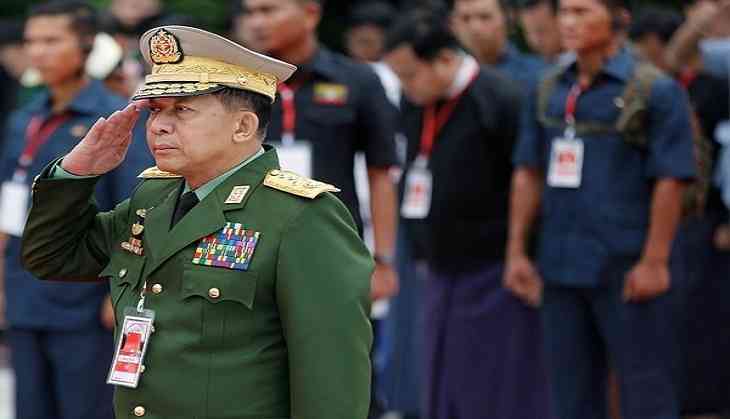How the saga of financial interest, Myanmar's military domination resulted in coup d'etat?

The military coup of Myanmar on February 1 is the saga of General Min Aung Hlaing financial interests and the military's unscrutinised economic domination, reported Asia Times.
"His financial interests must be considered as a motive for his coup," said the Justice for Myanmar campaign group of activists in a statement.
Citing sources, Asia Times reported that the coup d'etat by Aung Hlaing served the purpose of protecting himself, his family, and military colleagues from the possible investigation over their extensive, lucrative financial deals and economic holdings.
Justice for Myanmar campaign group also noted, "Senior General Min Aung Hlaing has ultimate authority over Myanmar's two military conglomerates - Myanmar Economic Corporation (MEC) and Myanmar Economic Holdings Limited (MEHL).
MEC and MEHL are reportedly invested in Myanmar's commercial port activity, container depots, jade and ruby mining, real estate, construction and other lucrative sectors.
Min Aung Hlaing's son, Aung Pyae Sone, operates a "medical supply business, A&M Mahar, sells Food and Drug Administration clearances and brokers imports, as well as trading and marketing pharmaceuticals and medical technology," the statement said.
"Aung Pyae Sone also owns Azura Beach Resort, which promotes itself as the 'largest resort in Chaung Tha'," a seaside area in the Ayeyarwady Region popular with Yangon elites. Sky One Construction was granted permission a few years ago to "build a resort on 22.22 acres of land leased from the government... Sky One Construction is owned by Aung Pyae Sone," it said.
"Aung Pyae Sone's wife, Myo Yadanar Htaik is also in business, including as a director of Nyein Chan Pyae Sone Manufacturing & Trading Company with her husband.
"Min Aung Hlaing's daughter, Khin Thiri Thet Mon, owns Seventh Sense, a media production business that makes big budget films and has exclusive contracts with Nay Toe and Wut Hmone Shwe Yi," the statement said.
The list of the family's holdings is long and wide. A UN report in 2019 said MEC and MEHL "are contributing to supporting the Tatmadaw's [military's] financial capacity."
It said those military conglomerates display a "high risk of contributing to or being linked to, violations of human rights law and international humanitarian law."
Aung Hlaing, the coup-leader also enjoys strong support from fellow officers, including those who have benefited from the military's various business ventures, said Richard S Ehrlich, writer of the article.
Ehrlich reported that Aung Hlaing pleased the rank and file with recent procurements of expensive weaponry and equipment from China, Russia, Israel and others, deals which traditionally have allowed top generals to skim off inflated public prices.
"Senior General Min Aung Hlaing had rich economic and financial incentive to stage his democracy-suspending putsch," said Ehrlich.
Corruption watchdog Transparency International has consistently ranked Myanmar among the most offenders worldwide, according to its Corruption Perceptions Index.
But it is the tight control Min Aung Hlaing, his family and his military comrades enjoy that makes their financial activities especially problematic to measure without public scrutiny or accounting over their profits and transfers of ownership, reported Asia Times.
If Min Aung Hlaing had retired instead of launching his February 1 coup, he would have potentially been vulnerable to financial investigations under Aung San Suu Kyi's new National League for Democracy (NLD)-led government, which won in a landslide against the military's proxy party at last November's election, wrote Ehrlich.
International pressure against Min Aung Hlaing has been building since his military's brutal crackdown on the Rohingya minority and was expected to target him more intensely in the months ahead, reported Asia Times.
Moreover, UN investigators have said the military should be prosecuted for "genocide" when it massacred, raped and expelled Rohingya from western Myanmar in 2016-17. More than 730,000 Rohingya fled to neighbouring Muslim-majority Bangladesh, where they continue to languish in wretched refugee camps.
In 2019, the US slapped sanctions against Min Aung Hlaing and three other military leaders for their role in abuses against the Rohingya.
Those sanctions came under the Global Magnitsky Human Rights Accountability Act and froze any assets held by Min Aung Hlaing and three other officers in the US. American business relations with them were criminalized under the sanctions.
The military ruled consecutively for decades, starting with a 1962 coup and bolstered by a 1988 putsch, before allowing for a quasi-democratic transition that saw Suu Kyi and the NLD win elections in 2015 and 2020.
Still, the military maintained its political role through military appointees with veto power in parliament and control of the powerful home, defence and border affairs ministries.
Previous military regimes ran down the economy from one of the most prosperous in the region to its current grotesque inequality, which has been worsened by decades of international sanctions.
Thus, the move by Aung Hlaing of coup d'etat amply clarifies how finance and the military's unscrutinised economic domination led to the unfolding of the events in Myanmar.
(ANI)

